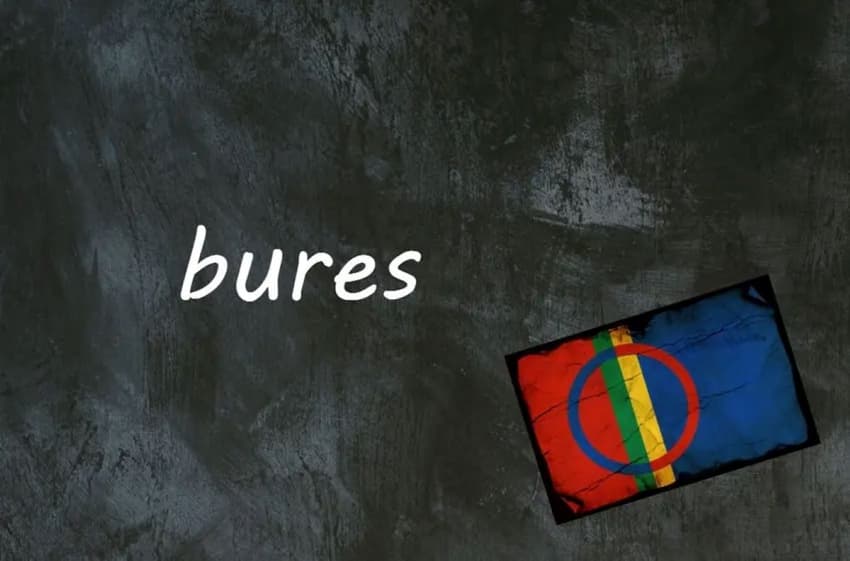Norwegian word of the day: Bures

Today’s word of the day isn’t actually Norwegian, and instead belongs to the minority Northern Sami language.
February 6th marks Sami National Day, so we’ve picked a Sami word for today’s offering.
The Sami are the indigenous people of Sápmi, a region spanning the northernmost areas of Norway, Sweden and Finland, as well as the Kola peninsula in Russia. The Sami language is not technically one language, but rather nine, with different variants of the Sami language spoken in different parts of Sápmi. These variants are considered to be mutually intelligible, similar to the relationship between Swedish, Danish and Norwegian.
Unlike Norwegian, which is a northern Germanic language, Sami belongs to the Finno-Ugric language group, along with Finnish, Estonian, Karelian, Hungarian and a number of smaller languages spoken in Russia.
Sami, unlike Norwegian, has many grammatical cases, and it is a highly inflected language (meaning the form or end of a word changes depending on how they are used in a sentence). Lule and Northern Sami have eight grammatical cases.
Less than one percent of the population in Norway speaks Sami. From the 1700s, the Norwegian government carried out the official policy of trying to eradicate the language to assimilate the non-Norwegian-speaking population into an ethnically and culturally uniform society.
What does bures mean?
Bures is both an adverb meaning well or good, as well as the word for hello and is used in the phrase bures boahtin (welcome, literally ‘good arrival’).
The word draws from the adjective buorre, also meaning good, which you will see in time-based greetings like buorre beaivi (good day), buorre eahket (good evening), buorre iđit (good morning) and buorre idjá (good night).
It can also be used in seasonal phrases such as Buorit Juovllat ja Buorre Ođđa Jahki (Merry Christmas and a Happy New Year) and buorit beassážat (happy Easter)
You might expect that it would also be used when wishing someone a happy Sami National Day, but the word lihkku is used here instead. Lihkku is a word meaning luck or fortune, loaned into Northern Sami via Finnish lykky, which in turn loaned it from Swedish lycka, meaning luck.
If you wanted to wish someone a happy Sami National Day, you would say lihkku sámi álbmotbeivviin. Álbmot here means a people, nation or group, and beivviin is the conjugated form of beaivi, the word for day or sun.
If you want to wish someone a happy Sami Day in one of the other Sami languages, then you use Vuorbbe biejvijn for Lule Sami and Lähkoeh biejjine for Southern Sami.
Comments
See Also
February 6th marks Sami National Day, so we’ve picked a Sami word for today’s offering.
The Sami are the indigenous people of Sápmi, a region spanning the northernmost areas of Norway, Sweden and Finland, as well as the Kola peninsula in Russia. The Sami language is not technically one language, but rather nine, with different variants of the Sami language spoken in different parts of Sápmi. These variants are considered to be mutually intelligible, similar to the relationship between Swedish, Danish and Norwegian.
Unlike Norwegian, which is a northern Germanic language, Sami belongs to the Finno-Ugric language group, along with Finnish, Estonian, Karelian, Hungarian and a number of smaller languages spoken in Russia.
Sami, unlike Norwegian, has many grammatical cases, and it is a highly inflected language (meaning the form or end of a word changes depending on how they are used in a sentence). Lule and Northern Sami have eight grammatical cases.
Less than one percent of the population in Norway speaks Sami. From the 1700s, the Norwegian government carried out the official policy of trying to eradicate the language to assimilate the non-Norwegian-speaking population into an ethnically and culturally uniform society.
What does bures mean?
Bures is both an adverb meaning well or good, as well as the word for hello and is used in the phrase bures boahtin (welcome, literally ‘good arrival’).
The word draws from the adjective buorre, also meaning good, which you will see in time-based greetings like buorre beaivi (good day), buorre eahket (good evening), buorre iđit (good morning) and buorre idjá (good night).
It can also be used in seasonal phrases such as Buorit Juovllat ja Buorre Ođđa Jahki (Merry Christmas and a Happy New Year) and buorit beassážat (happy Easter)
You might expect that it would also be used when wishing someone a happy Sami National Day, but the word lihkku is used here instead. Lihkku is a word meaning luck or fortune, loaned into Northern Sami via Finnish lykky, which in turn loaned it from Swedish lycka, meaning luck.
If you wanted to wish someone a happy Sami National Day, you would say lihkku sámi álbmotbeivviin. Álbmot here means a people, nation or group, and beivviin is the conjugated form of beaivi, the word for day or sun.
If you want to wish someone a happy Sami Day in one of the other Sami languages, then you use Vuorbbe biejvijn for Lule Sami and Lähkoeh biejjine for Southern Sami.
Join the conversation in our comments section below. Share your own views and experience and if you have a question or suggestion for our journalists then email us at [email protected].
Please keep comments civil, constructive and on topic – and make sure to read our terms of use before getting involved.
Please log in here to leave a comment.